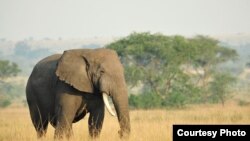WASHINGTON —
An international gathering in Botswana has come to agreement on the urgent steps to be taken to combat the illegal trade in ivory and protect elephant populations in Africa.
The International Union for Conservation of Nature announced the measures on Tuesday, the second day of the African Elephant Summit in Botswana's capital, Gabarone.
The agreement calls for governments to classify ivory trafficking as a "serious crime" and impose "maximum" sentences for wildlife offenses. It also urges nations to cooperate in legal matters such as extradition and asset seizure and forfeiture.
Botswanan President and summit host Ian Khama welcomed the steps.
"Strong momentum from all over the world is developing to turn this tide and many nations and individuals are calling for solutions that are implementable and will work. It is now time for Africa and Asia to join forces to protect this universally valued species. I wholeheartedly invite your active participation and equally anticipate your unprecedented commitment to action," said Khama.
The gathering included government agencies and conservation groups from African nations that host elephant populations and Asian nations where ivory has long been in demand.
International Union for Conservation of Nature chief Julia Marton-Lefevre said the broad range of participants is a good sign.
"The fact that this was a meeting involving the entire value chain of the elephant situation, the range countries, the transition countries and the consumer countries was unique and very important. And I think this sort of model will actually be followed in other parts of the world for other species and of course the Asian elephant also," said Marton-Lefevre.
Organizers said Africa could stand to lose as much as 20% of its elephant population in 10 years if illegal poaching continues at the current rate.
They said poaching has increased in recent years due to poverty and weak governance in Africa, combined with rising demand in ivory-consuming nations.
An estimated 500,000 elephants remain in the continent. Botswana's wildlife and tourism minister Tshekedi Khama described them as a national asset.
"I think it is very important… that we take ownership, because having elephants and wildlife is sustainable and it also gives livelihood to communities. And if we deplete those resources, we also deplete the livelihood through tourism through wildlife and various other ways to the communities, remembering that we don't always start on the same level as everybody else. So the decisions we make today are the decisions not just for us at our level, but decisions for people who live in our countries,” said the minister.
Elephant tusks are desirable in some Asian nations where people use them as ornaments and for traditional medicine.
The International Union for Conservation of Nature announced the measures on Tuesday, the second day of the African Elephant Summit in Botswana's capital, Gabarone.
The agreement calls for governments to classify ivory trafficking as a "serious crime" and impose "maximum" sentences for wildlife offenses. It also urges nations to cooperate in legal matters such as extradition and asset seizure and forfeiture.
Botswanan President and summit host Ian Khama welcomed the steps.
"Strong momentum from all over the world is developing to turn this tide and many nations and individuals are calling for solutions that are implementable and will work. It is now time for Africa and Asia to join forces to protect this universally valued species. I wholeheartedly invite your active participation and equally anticipate your unprecedented commitment to action," said Khama.
The gathering included government agencies and conservation groups from African nations that host elephant populations and Asian nations where ivory has long been in demand.
International Union for Conservation of Nature chief Julia Marton-Lefevre said the broad range of participants is a good sign.
"The fact that this was a meeting involving the entire value chain of the elephant situation, the range countries, the transition countries and the consumer countries was unique and very important. And I think this sort of model will actually be followed in other parts of the world for other species and of course the Asian elephant also," said Marton-Lefevre.
Organizers said Africa could stand to lose as much as 20% of its elephant population in 10 years if illegal poaching continues at the current rate.
They said poaching has increased in recent years due to poverty and weak governance in Africa, combined with rising demand in ivory-consuming nations.
An estimated 500,000 elephants remain in the continent. Botswana's wildlife and tourism minister Tshekedi Khama described them as a national asset.
"I think it is very important… that we take ownership, because having elephants and wildlife is sustainable and it also gives livelihood to communities. And if we deplete those resources, we also deplete the livelihood through tourism through wildlife and various other ways to the communities, remembering that we don't always start on the same level as everybody else. So the decisions we make today are the decisions not just for us at our level, but decisions for people who live in our countries,” said the minister.
Elephant tusks are desirable in some Asian nations where people use them as ornaments and for traditional medicine.











